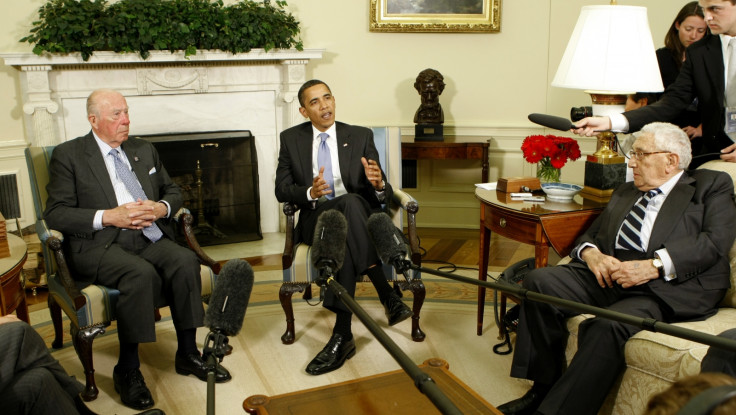Henry Kissinger and George Schultz warn against Barack Obama's Iran nuclear deal

Former US secretaries of state Henry Kissinger and George Schultz have criticised Barack Obama for agreeing to the framework for a nuclear deal with Iran.
The statesmen argue in a Wall Street Journal op-ed that the deal concedes the option of using military force to compel Iran to comply to the terms of the deal.
"Mixing shrewd diplomacy with open defiance of UN resolutions, Iran has gradually turned the negotiation on its head," Kissinger and Shultz write. "Iran's centrifuges have multiplied from about 100 at the beginning of the negotiation to almost 20,000 today. The threat of war now constrains the West more than Iran."
"While Iran treated the mere fact of its willingness to negotiate as a concession, the West has felt compelled to break every deadlock with a new proposal. In the process, the Iranian program has reached a point officially described as being within two to three months of building a nuclear weapon. Under the proposed agreement, for 10 years Iran will never be further than one year from a nuclear weapon and, after a decade, will be significantly closer."
Kissinger, the secretary of state under Republican President Richard Nixon, and Schultz, who held the role under Republican Ronald Reagan affirm their "respect" for Obama's Democrat administration, but argue that the terms for the inspection of the facilities by international monitors are insufficiently clear.
"Under the new approach, Iran permanently gives up none of its equipment, facilities or fissile product to achieve the proposed constraints. It only places them under temporary restriction and safeguard - amounting in many cases to a seal at the door of a depot or periodic visits by inspectors to declared sites. The physical magnitude of the effort is daunting. Is the International Atomic Energy Agency technically, and in terms of human resources, up to so complex and vast an assignment?" they argue.
They claim that Iran has a long history of violating international agreements.
"Devising theoretical models of inspection is one thing. Enforcing compliance, week after week, despite competing international crises and domestic distractions, is another."
This week, Obama launched a broad effort to convince US lawmakers and critics to embrace the framework nuclear deal, which was agreed on last week after months of negotiation last week, and is set to be finalised in June.
In a Reuters/Ipsos poll, 31% of Republicans, whose party controls Congress, said they were in favour of a nuclear deal with Iran, with 30% opposed and 40% undecided.
© Copyright IBTimes 2025. All rights reserved.






















